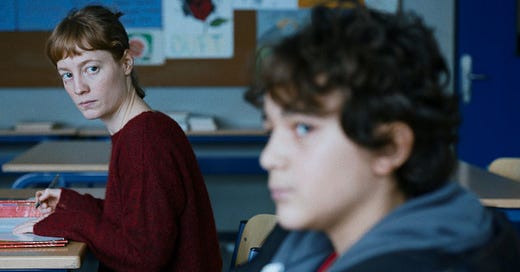The Teacher's Lounge
This Oscar-nominated German drama examines the fragile power dynamics and conflicts at a school as a young teacher takes a stand, but falters at the follow-through.
The longest two weeks of my life was substitute teaching a class of 8th graders. They were actually the advanced students at a good school, but the combination of their raging hormones and short attention span, along with my inexperience at classroom management, made for a less than productive fortnight. It stoked my respect for the real teachers who do this sort of thing day in, day out.
“The Teacher’s Lounge,” which was a surprise nominee for the Academy Award for best foreign language film, brought back haunting memories of those days. It’s centered around Carla Nowak, a young teacher at a German school where she teaches math to adolescents.
Carla seems to have a good grip on her students. She genuinely cares about them as people and brings an individual touch to each kid. When the class is getting talkative, all she has to is clap once, and then everybody joins in for two more claps together, bringing everyone to silence.
Wish I’d had that one in my toolkit back when.
Directed by İlker Çatak, who co-wrote the script with Johannes Duncker, the film sets about half the action in Carla’s classroom and the other half in the titular space for teachers to unwind, grab some coffee and grade papers. A new teacher for the current school year, Carla is still navigating her place in a settled social structure.
As the story opens, the school has been plagued with a rash of burglaries, including in the teacher’s lounge. Early on all the girls in Carla’s class are asked to leave the room and the boys are ordered to leave their wallets at their desks for inspection. It’s technically voluntarily, but it’s made clear suspicion will fall on anyone who does not comply.
Ali, the son of Middle Eastern immigrants, is found to have a large amount of cash, which he claims was given to him by his parents to buy a video game. They confirm this, and the matter is dropped. But ill feelings linger.
Carla grows suspicious that another faculty member is actually responsible for the thefts. She spots another teacher casually rifling through the kitty where they throw in their coins to pay for their coffee. She sets a trap by leaving her coat and wallet in the lounge while surreptitiously keeping her laptop camera recording while she oversees gym class.
Sure enough, her cash has been stolen and the video shows a woman wearing a blouse with stars as the culprit, though her face is unseen. Carla confronts the obvious suspect, Mrs. Kuhn (Eva Löbau ), the front-office secretary who’s a bit of a petty tyrant. Her blouse matches the suspect’s, but she haughtily refuses the accusation. The principal, Dr. Böhm (Anne-Kathrin Gummich), is brought in and Kuhn is placed on administrative leave.
Complicating matters, Kuhn’s son, Oskar (Leonard Stettnisch), is one of Carla’s students. At first confused and afraid for his mom, he grows increasingly morose and hostile. The incident becomes the cause célèbre among the student body, with many lining up behind Kuhn and Oskar, and Carla starts to lose control of her classroom. Her fellow teachers also feel violated that she invaded their privacy by recording video in the lounge they consider a safe space.
Things go from there. Part of Carla’s problem is that she is actually the most lenient of the teachers, and clashes with her peers who advocate harsher punishment for Kuhn and, as his behavior worsens, Oskar. Firing and expulsion are discussed. A one-sided article in the student newspaper stokes the fury of students, faculty and parents alike.
Leonie Benesch plays Carla, and it’s a tightly wound performance that evokes both empathy and frustration from the audience. She takes it upon herself to solve the mystery of the stealing, but then naively asserts that Kuhn shouldn’t lose her job over evidence that doesn’t conclusively prove her guilt. She also wants to protect Oskar even as he becomes a force of disruption and discord for her other students.
At one point she even offers that she, rather than the alleged offenders, be the one to move to another school. Her heart’s in the right place but her brain still has much navigating to do.
“The Teacher’s Lounge” is a school drama but in a lot of ways uses the form and tactics of a suspenseful thriller. The tension grows palpable as things go on, Carla walking through the halls feeling the antagonism assaulting her from all sides. The musical score by Marvin Miller adds to this claustrophobic effect, a cacophony of asymmetrical melodies and clashing tones.
It’s hard to be a child in puberty, and in some ways even harder to be the one who teaches them. Carla sets off an imbroglio and then tries to deescalate it without the same savvy she brings to the classroom. It’s a common mistake of good people thinking others will treat them with the same positive regard they show themselves.





